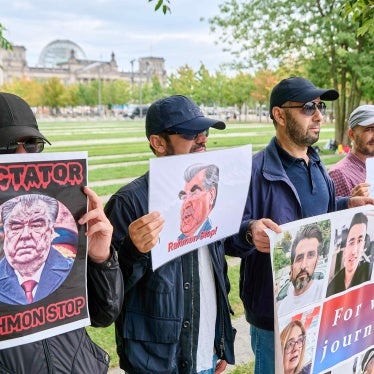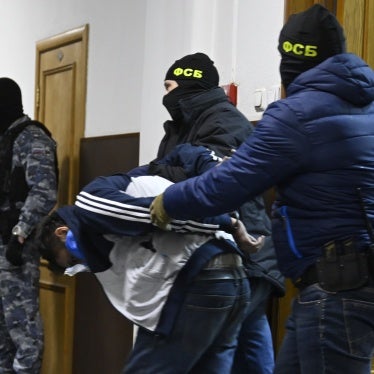Allegations of torture and a lack of evidence have marred a political trial against five ethnic Albanian students that resumed today in Belgrade, Human Rights Watch said.
The five male defendants, all of them students at Belgrade University, are charged with terrorism and anti-state activities due to their alleged involvement with the Kosovo Liberation Army (KLA). They testified in court that they had been tortured to extract confessions.
The trial in Belgrade District Court, under way since late November, has failed to produce any credible evidence against the accused, said Human Rights Watch, which has been monitoring the proceedings.
"This trial is proceeding at the whim of the Serbian political authorities, not on the facts of the case," said Holly Cartner, executive director of Human Rights Watch's Europe and Central Asia Division. "This is the pattern we've seen again and again in such trials against ethnic Albanians from Kosovo."
Petrit Berisha (age 30), his brother Driton Berisha (age 27), Driton Meqa (age 28), Shkodran Derguti (age 32), and Isam Abdulahu (age 32) were arrested by Serbian police between April 29 and May 11, 1999, in Belgrade, and held incommunicado until the beginning of July, when they were brought before an investigating judge. They face possible prison terms ranging from ten to twenty years.
All of them testified that they had been forced to sign confessions—which were then broadcast on the state-run television—after undergoing physical abuse. In response to the students' complaints, presiding judge Dragisa Slijepcevic said: "I would like to ask the journalists and the public in the courtroom: Do you think the police in European countries act differently?"
In a positive development, however, today the court refused to accept as evidence self-accusatory statements made by Petrit Berisha in pre-trial proceedings.
Yugoslavia has ratified the Convention against Torture, and the Yugoslav Constitution and Penal Code expressly forbid the use of force to obtain a statement or a confession from the accused. Article 233 of the Yugoslav Criminal Procedure Code states that court decisions cannot be based solely on a defendant's confession. The defendants face charges of conspiracy for enemy activities. Between February 1998 and April 1999, they are alleged to have collected money from ethnic Albanians in Belgrade to purchase weapons, ammunition, and propagandistic material for the KLA. The indictment also charges them with planning terrorist acts in Belgrade during the NATO military intervention against Yugoslavia. Petrit Berisha is also accused of having fought with the KLA in Kosovo in July and August 1998, and of having killed a number of policemen.
In the first part of the trial, held on November 23, 25, and 26, the defendants rejected all charges in the indictment. The trial continued today with witness testimonies, and the court's decision is likely to be rendered next January.
At the beginning of the trial in November, Judge Slijepcevic, president of the five-member chamber, made several remarks suggesting that a guilty verdict will be rendered regardless of the facts. He told defense attorneys that they were free to complain about any procedural decisions by the court "in the appeal against the judgment," thus implying that the verdict would be against the students.
The prosecutor based his case on the fact that several bombs were allegedly discovered by police on May 11 in the apartment of Shkodran Derguti's Serbian girlfriend. In his defense, Derguti explained that four hours had passed between the moment when the police took the apartment keys and the time when the bombs were reportedly discovered. Derguti requested that his fingerprints be taken on the spot, but the police rejected his request.
Another piece of evidence offered by the prosecution—a notebook with lists of Albanian names and military instructions—is even more questionable. In court, Petrit Berisha and Shkodran Derguti separately testified that their names were written in the book with a different pen from the one used in the rest of the notebook. They also noted that their names were written improperly, with the Serbian rather than Albanian spelling.
"We call on the court to resist political pressure, and to judge this case on the basis of the facts," said Holly Cartner. "This is an opportunity to reimpose the rule of law in Serbia's judicial system."
At least 1,700 other ethnic Albanians from Kosovo are currently being held in Serbian prisons, having been transferred out of Kosovo jails just before NATO entered the province. Trials and convictions have been taking place on a regular basis throughout the fall. On December 9, a prominent doctor and women's rights activist, Dr. Flora Brovina, was sentenced to twelve years in prison for anti-state activities.
In related news, a well-known human rights lawyer from Kosovo, Teki Bokshi, was released today after thirteen days in police detention. Bokshi was arrested by plain-clothes policemen on December 3, about ten miles outside of Belgrade, as he returned from visiting his ethnic Albanian clients in prison.
For more information about political prisoners in Serbia, see Focus on Kosovo. See also the website of the Kosova Association of Political Prisoners








